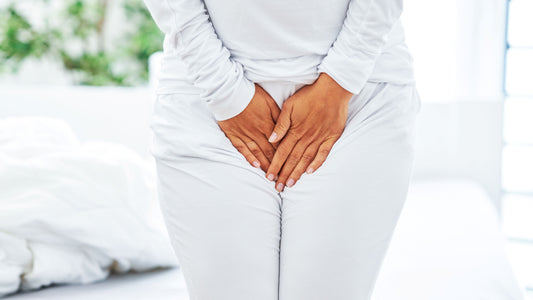Sex after 40. For many perimenopausal and menopausal women, this stage of life marks a dramatic shift in libido — sometimes dwindling to near-zero, other times surging with unexpected intensity.
The truth is, there’s no one-size-fits-all narrative. Your sexual experience after 40 is shaped by your hormones, stress levels, physical health, emotional needs…and your relationship.
Understanding why these changes might occur can be the key to reclaiming energy, pleasure, and vibrancy in midlife. So let’s dig in, shall we?
In this article, you will learn:
Why libido changes after 40 (and why it can go up or down)
What hormones, lifestyle, and vaginal health have to do with desire
How to support libido for more energy, vitality, and well-being
Let’s start by exploring the two very different experiences many women have when it comes to libido in midlife.


There’s a cultural myth that women “lose interest in sex” after 40, as if midlife marks a universal sexual shutdown. But for many women, the truth is far more nuanced — and far more interesting.
A lot of women do experience a steep decline in libido during perimenopause and menopause. Others, however, report a powerful resurgence in sexual desire, often stronger and more liberating than at any earlier point in life.
These opposing experiences are both valid and both rooted in real physiological and emotional changes.
👉 For some, shifts in estrogen and progesterone can disrupt vaginal comfort, energy, and emotional balance, making desire harder to access.
👉 For others, the lifting of child-rearing stress, the freedom of sex without pregnancy fears, or hormonal fluctuations (like a temporary spike in testosterone) can bring about unexpected freedom and passion.
What’s important to understand is this: there is no “right” path. Your experience with sex after 40, whether you feel disconnected from desire or newly energized by it, isn’t abnormal. It’s part of a bigger hormonal, neurological, and emotional rebalancing that deserves compassion and curiosity, not shame.
Next, we’ll look deeper into what’s actually happening with your hormones and why those changes can affect your sex drive in very different ways.
Estrogen, Progesterone, And Testosterone After 40
Your hormones are major players in shaping your sex drive, and after 40, they begin to dance to a new rhythm — sometimes a chaotic one. Understanding how each hormone contributes to desire (or the lack of it) is key to demystifying the shifts you may be feeling.
Estrogen
It plays a foundational role in sexual and vaginal health. As estrogen levels drop, the vaginal walls can become thinner, drier, and less elastic — a condition called vaginal atrophy. This can make intercourse physically uncomfortable or even painful, which naturally leads to a dip in interest. But beyond the physical, estrogen also supports mood stability, mental clarity, and a sense of emotional connection — which I think we’d all agree are essential ingredients for sexual desire.

Progesterone
It is often one of the first hormones to drop in perimenopause, is known for its calming, sleep-supporting qualities. Low progesterone can contribute to anxiety, sleep disruption, and irritability, all of which quietly sap libido in the background.

Estrogen plays a foundational role in sexual and vaginal health. As estrogen levels drop, the vaginal walls can become thinner, drier, and less elastic — a condition called vaginal atrophy. This can make intercourse physically uncomfortable or even painful, which naturally leads to a dip in interest. But beyond the physical, estrogen also supports mood stability, mental clarity, and a sense of emotional connection — which I think we’d all agree are essential ingredients for sexual desire.

Progesterone
It is often one of the first hormones to drop in perimenopause, is known for its calming, sleep-supporting qualities. Low progesterone can contribute to anxiety, sleep disruption, and irritability, all of which quietly sap libido in the background.

Testosterone
It is so often overlooked in women’s health discussions. Though present in much smaller amounts than in men, testosterone is crucial for libido, sexual fantasy, and even the motivation to seek pleasure. Some women experience a temporary increase in testosterone relative to other hormones during perimenopause, which can actually boost desire. For others, declining levels may contribute to the feeling many women describe as “a complete loss of interest in ever having sex again.”

Testosterone
It is so often overlooked in women’s health discussions. Though present in much smaller amounts than in men, testosterone is crucial for libido, sexual fantasy, and even the motivation to seek pleasure. Some women experience a temporary increase in testosterone relative to other hormones during perimenopause, which can actually boost desire. For others, declining levels may contribute to the feeling many women describe as “a complete loss of interest in ever having sex again.”

It’s this complex interplay between estrogen, progesterone, and testosterone that helps explain why sex after 40 looks so different for every woman. Whether you’re feeling newly awakened or mysteriously flatlined, your hormones likely hold part of the answer.
Vaginal Dryness and Atrophy: The Silent Driver of Discomfort and Disinterest
One of the most common and least talked about reasons women lose interest in sex after 40 is simple: it hurts.
As estrogen levels decline during perimenopause and menopause, the vaginal tissue loses moisture, elasticity, and natural lubrication. This condition, known as vaginal atrophy or genitourinary syndrome of menopause (GSM), can make intercourse feel irritating, abrasive, and painful.
It’s not just about dryness; the entire vaginal environment becomes more fragile, making sexual activity feel like too much.
Understandably, many women begin to withdraw from intimacy — not because they don’t want connection or pleasure, but because their body no longer feels like a safe place for it. This leads to a cycle: discomfort creates avoidance, and avoidance can further reduce blood flow and tissue resilience, compounding the problem. Because the less you “use” your tissues down there, the faster they atrophy.
A high-quality lubricant can certainly help in the bedroom, but long-term relief often requires a multi-pronged approach that includes localized hormone therapies, adrenal support, and lifestyle changes.
One of the most powerful tools I’ve found is vaginal DHEA, a key component in my Julva® formula. Many women find that when they use it daily it helps to maintain skin softness, elasticity, and moisture balance. Make Julva part of your daily self-care routine.
If your desire has faded alongside increasing discomfort, know this: the issue may be physical, not psychological. And with the right support, it’s possible to reclaim both comfort and confidence in your body.
In the next section, we’ll explore a very different experience: what happens when libido increases in midlife — and why that’s just as real and important to understand.
When Libido Increases: The Freedom Of Midlife Desire
Not every woman experiences a dip in libido after 40. In fact, for some, this phase of life unlocks a powerful sexual reawakening — one marked by deeper confidence, stronger boundaries, and a desire that feels more self-directed than ever before.
There are both emotional and biological reasons why this happens. For many women, midlife comes with a sense of freedom: the pressure to be everything to everyone begins to lift as children grow older, pregnancy fears may disappear, and there’s often a renewed focus on personal fulfillment.
With years of experience behind them, many women finally feel safe enough to explore pleasure on their own terms — without shame, guilt, or apology. And of course, I am here for all of that.
On a physiological level, the story gets even more interesting. In perimenopause, estrogen and progesterone levels often fluctuate wildly. When progesterone drops faster than testosterone, some women experience a relative testosterone dominance. This hormonal shift can heighten libido, boost confidence, and spark an increased interest in sex. It may also come with increased acne and chin hairs, but we’re focusing on the positive here.
Women with healthy adrenal function may also find they weather hormonal changes more smoothly. Since the adrenal glands take over some hormone production after perimenopause, those with strong adrenal resilience may maintain more stable energy, mood, and sexual desire.
Bottom line: if your libido has surged in midlife, there’s nothing “weird” about it. It’s not a last gasp or an anomaly — it’s a sign that your relationship with yourself and your body is evolving.


When your sex drive feels like it has completely vanished, it might not just be hormones or vaginal changes — it could be your adrenals crying out for help.
The adrenal glands are responsible for producing cortisol, your primary stress hormone. But they also play a critical backup role in hormone production after menopause, especially when the ovaries begin to close up shop. That means your body’s ability to maintain hormonal balance could depend heavily on how well your adrenals are functioning.
If you've been living with chronic stress, poor sleep, blood sugar crashes, or burnout, your adrenals may already be struggling. This can lead to what's often referred to as adrenal fatigue or HPA axis dysfunction — a state where your body conserves energy by reducing non-essential functions like libido, motivation, and reproductive health.
In other words, when your body is in survival mode, pleasure is the first thing to go…and your energy levels absolutely plummet.
Supporting your adrenal health can be a game-changer for libido, energy, and overall vitality.
Start with the basics:
Ask for help, especially from your partner — sometimes, this is the magic that restores your energy levels and your sex life, because it helps clear up resentment in your relationship plus gives you more time
Prioritize restorative sleep
Eat balanced meals that include healthy fats (your body uses cholesterol to make hormones!)
Reduce caffeine and alcohol
Practice stress reduction techniques like breathwork, walking, or journaling — this helps your adrenals switch out of cortisol production and stress mode to hormone-generating mode, resulting in better hormonal balance
Consider adaptogenic herbs; they are wonderful for nourishing your adrenals and your sex drive (of course, consult with your practitioner first)
Remember, if your sex drive has gone quiet, your body is not broken — it may just be exhausted.
How To Improve A Woman's Sex Drive After 40
Low libido after 40 oftentimes isn’t just about hormones.
Which is great news because that means you have the power to make changes that directly affect your libido.
Here are 3 places to start:


Start with actually listening to what your body tells you it needs.
That may look like resting if you’re tired. It may look like reconnecting with an old hobby that brought you joy but abandoned when you had kids. It could mean traveling more. Or starting pelvic floor therapy.
While I’d love to tell you exactly what steps to take here, this is a process that involves individual work and some deep reflection. Many women find themselves in a season of life that follows decades of sacrificing their needs for others and it takes a bit of thought to get back in touch with what puts a smile on your face.
If you’re struggling with this, start by taking a daily walk. This always helps unlock your thoughts and emotions, which in turn leads to increased desire.


Desire rarely thrives in silence. Share what feels good, what doesn’t, and what support you need. Sometimes, just naming the disconnection removes the shame and creates space for reconnection.


As we’ve talked about, there are absolutely physiological changes taking place in your body right now. Here are the most common ways to help support your body’s ability to counterbalance them.
- Explore vaginal DHEA. It can be a game-changer.
- Support adrenal function using all of the tips I outlined in the section above.
- Focus on blood sugar balance with a Keto-Green® diet. Get a complete meal plan for FREE here.
- Check out libido-supportive supplements like maca. There’s a reason it’s called the “Peruvian Viagra.”
Girlfriend, addressing your sex drive isn’t just about having more sex. It’s about restoring your life force—your right to feel energized, inspired, and at home in your body again. Working on the problem from multiple angles might be necessary, and that’s totally OK!
Why Sexual Health Matters: It’s Not Just About Intimacy
Too often, discussions about midlife sexuality focus narrowly on keeping your partner satisfied or maintaining a marriage. But your sexual health after 40 is about so much more than that — it’s a powerful reflection of your overall well-being.
A healthy libido is often a sign that your hormones are balanced, your nervous system feels safe, and your body has enough energy to support pleasure. In this way, desire isn’t just about intimacy—it’s a vital sign. When sex disappears from your life, it’s not a moral failing; it’s a clue that something in your system may need attention.
Regular sexual activity (whether solo or with a partner) comes with real physiological benefits. Here are some benefits of sex after 40:
Increased blood flow and tissue integrity in the vagina
Better sleep, mood, and immune function
Enhanced pelvic floor strength and bladder control
A surge in oxytocin, the “connection hormone,” which reduces stress and fosters bonding
And then there’s the intangible but essential benefit: feeling alive. Feeling yourself. Feeling connected to your partner.
Whether you're asking “Can a 45-year-old woman be sexually active?” or wondering if it's worth the effort to rekindle desire, the answer is yes — not for anyone else, but for you. Because reclaiming your sexuality is ultimately about reclaiming your energy, vibrancy, and personal power in midlife and beyond.
What’s Normal?
One of the most common questions women ask in midlife is: “How often should I be having sex?” or “How often does a 40-year-old woman want sex?” The honest answer? There is no normal — only what’s right for you.
Cultural messages often paint an unrealistic picture of midlife sexuality, suggesting that either you're washed up or you're suddenly having the best sex of your life every night. In reality, the frequency of sex after 45 varies wildly, as it does earlier in life.
Some women feel sexually active once a week or more. Others are content with once a month, or prefer to focus on solo pleasure or nonsexual intimacy. All of these are valid.
What matters most is whether your current level of sexual activity feels satisfying to you.
Rather than chasing a number, ask yourself:
- Am I feeling connected to my body and my partner?
- Do I feel safe, respected, and emotionally fulfilled in my intimate life?
- Is there room for exploration, healing, or pleasure if I want it?
Reframing “normal” as natural for me, right now, takes the pressure off and creates space for sexual expression that actually supports your well-being…rather than becoming another performance metric.
Sex After 40: Final Thoughts
Whether your libido has cooled, intensified, or just become more complex, your sexual story in midlife deserves understanding, care, and celebration.
Reclaiming your sexual health isn’t just about improving intimacy — it’s about restoring your sense of self. Your pleasure, vitality, and connection are worth tending to, not just now, but for the decades to come.





